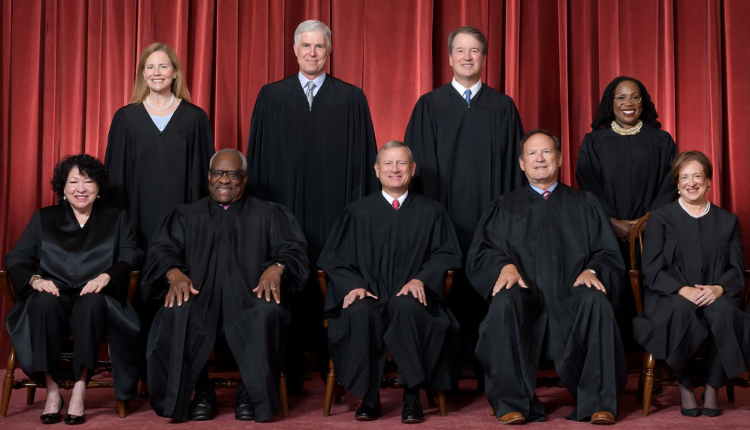Supreme Court adopts ethics code, addresses 'misunderstanding' that justices feel unrestrained by rules

In a statement released with the new Code of Conduct for Justices of the Supreme Court of the United States, the U.S. Supreme Court said the code “largely represents a codification of principles that we have long regarded as governing our conduct.” Photo by Fred Schilling via the Supreme Court website.
Updated: The U.S. Supreme Court announced Monday that it has adopted an ethics code amid controversies stemming in part from Justice Clarence Thomas’ acceptance of luxury travel from wealthy friends.
In a statement released with the new Code of Conduct for Justices of the Supreme Court of the United States, the Supreme Court said the code “largely represents a codification of principles that we have long regarded as governing our conduct.”
But the absence of a code “has led in recent years to the misunderstanding that the justices of this court, unlike all other jurists in this country, regard themselves as unrestricted by any ethics rules,” the Supreme Court said. “To dispel this misunderstanding, we are issuing this code.”
The New York Times, the Washington Post, Law360 and the Associated Press are among the publications with coverage of the new Code of Conduct for Justices of the Supreme Court of the United States.
“Left unclear,” the New York Times reports, “was how the code will be enforced.”
In a statement emailed to the ABA Journal, Gabe Roth, executive director of the court transparency group Fix the Court, said the new code is “largely a copy-and-paste job from the lower courts’ code.”
Under the Supreme Court ethics code, there is no way for a member of the public or a lawmaker to file an ethics complaint. And there is “no way for an outside source to advocate for recusal when a justice participates in a case despite an obvious conflict,” Roth said.
The ABA House of Delegates called on the Supreme Court to adopt a binding code of ethics at the 2023 ABA Midyear Meeting in February.
After the announcement, ABA President Mary Smith released a statement, calling the measure “a step that will help to promote public confidence in the court.”
“While today’s code does not address the important issue of enforcement, the ABA appreciates that Chief Justice John G. Roberts Jr. has directed a study of best practices for complying with the code,” Smith said.
Chief Justice John Roberts has directed court officers to examine best practices to assist the justices in complying with the canons, according to commentary at the end of the code.
The commentary says the code is “substantially derived from the Code of Conduct for U.S. Judges but adapted to the unique institutional setting of the Supreme Court.”
Addressing recusal standards, the commentary says the justices follow the same general principles and statutory standards as other federal judges. “But the application of those principles can differ” because a recusing justice can’t be replaced after recusal as lower-court judges can.
The recusal provisions depend on a justice’s knowledge of relationships or interests, according to the commentary. The Supreme Court receives 5,000 to 6,000 cert petitions each year, and the justices rely on disclosure statements.
In addition, the justices receive up to a thousand amicus filings each term.
“In light of the court’s permissive amicus practice, amici and their counsel will not be a basis for an individual justice to recuse,” the commentary says.
The best practices review will assess whether additional resources will be needed for conflicts checks and other ethics issues.
A series of revelations, including several news stories by ProPublica, raised concerns about Supreme Court ethics this year.
News reports said Thomas attended donor events orchestrated by the Koch network; sold a home and two vacant lots that he partly owned to a company owned by wealthy friend Harlan Crow, a Republican megadonor and billionare; traveled on Crow’s private yacht and flew on his private jet; and stayed at Crow’s private resorts.
ProPublica also reported that Justice Samuel Alito received a free Alaska fishing trip in 2008 that was arranged by Leonard Leo, then the leader of the Federalist Society.
And a story by the Associated Press reported in July that staff members for Justice Sonia Sotomayor pushed institutions hosting her appearances to buy the justice’s memoir or her children’s books.
One issue is whether Congress has the power to pass legislation that would bind the Supreme Court on ethics issues. Alito told the Wall Street Journal in July that he doesn’t think so.
“No provision in the Constitution gives them the authority to regulate the Supreme Court—period,” Alito said.
The Senate Judiciary Committee was undeterred, approving a bill in July that would have required the Supreme Court to adopt a code of ethics and send complaints to an investigative panel of lower-court judges.
Hat tip to @StevenMazie.
See also:
“Ethics code is ‘a good idea’ for Supreme Court, Justice Barrett says”
“A code of ethics is necessary to restore trust in the Supreme Court”
“Supreme Court justices should follow binding code of ethics, ABA House says”
“Justice Kavanaugh says he’s hopeful for ‘concrete steps’ on SCOTUS ethics matters”
“No summer break for Supreme Court ethics debate”
“ABA task force recommends ethics and transparency changes for Supreme Court”
Updated Nov. 13 at 5:49 p.m. to add ABA President Mary Smith’s statement.
Write a letter to the editor, share a story tip or update, or report an error.


